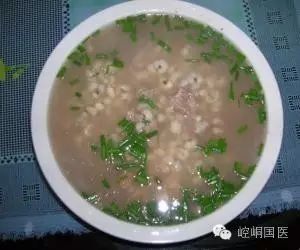
In real life, some people are easily angered, and those around them only know that this person has a bad temper, but rarely consider that this person may be suffering from a condition. In Traditional Chinese Medicine (TCM), being easily angered is referred to as “shan nu” (善怒), which falls under the category of disease. This condition is primarily related to the liver, specifically manifesting as three syndromes: liver qi stagnation (肝郁气滞), liver fire rising (肝火上炎), and spleen deficiency with liver overacting (脾虚肝乘). Here, we recommend several dietary therapies.
In TCM theory, being easily angered is primarily associated with the liver, specifically as liver qi stagnation, liver fire rising, and spleen deficiency with liver overacting. Traditional mental health practices can effectively help overcome negative emotions, allowing individuals to calm their anger through self-regulation. However, when emotions are particularly intense, it is also advisable to release anger through methods such as venting in a different location, rationally diffusing the situation, or redirecting attention to achieve emotional calmness.
1. Liver Qi Stagnation
The symptoms include frequent sighing, chest and rib pain or discomfort. The causes of liver qi stagnation are often due to depression, mental stimulation, or a history of emotional trauma.
Countermeasures: First, one should use mental health practices to regulate the mind and emotions, and treat the underlying causes through methods of emotional release. In terms of diet, it is beneficial to consume foods that promote liver qi flow, such as celery (芹菜), mugwort (蓬蒿), tomatoes (西红柿), radishes (萝卜), oranges (橙子), pomelos (柚子), tangerines (柑橘), citron (香橼), and Buddha’s hand (佛手).
Recommended Dietary Therapy:
Radish and Glutinous Rice Porridge

Ingredients: Fresh radish, glutinous rice.
Method: Chop the fresh radish and cook it together with glutinous rice to make porridge.
Effects: Radish has the effects of promoting qi, replenishing deficiency, aiding digestion, and resolving phlegm. As Li Shizhen once said: “Radish porridge aids digestion and benefits the diaphragm.”
2. Liver Fire Rising
The symptoms include vivid dreams during sleep, red and swollen eyes, bitter taste in the mouth, and thirst. The causes are often due to prolonged liver qi stagnation, excessive smoking and drinking, or overconsumption of rich and spicy foods.
Countermeasures: In addition to quitting smoking and limiting alcohol intake, and avoiding rich and spicy foods, one should consume more foods that clear the liver and drain heat, such as bitter melon (苦瓜), bitter herbs (苦菜), tomatoes (西红柿), mung beans (绿豆), mung bean sprouts (绿豆芽), soybean sprouts (黄豆芽), celery (芹菜), cabbage (白菜), bok choy (包心菜), daylily (金针菜), rapeseed (油菜), loofah (丝瓜), plums (李子), green plums (青梅), hawthorn (山楂), and citrus fruits (柑橘).
Recommended Dietary Therapy:
1. Cassia Seed Porridge

Ingredients: Roasted cassia seeds (决明子) 10-15 grams, glutinous rice 100 grams, a small amount of rock sugar, or add white chrysanthemum (白菊花) 10 grams.
Method: First, roast the cassia seeds in a clay pot until fragrant, then cool and decoct the juice or decoct with white chrysanthemum, strain out the residue, and add to the glutinous rice to cook porridge. When nearly done, add rock sugar and boil for another 1-2 minutes before serving. A course of treatment lasts 5-7 days.
Effects: Suitable for red and swollen eyes due to liver fire rising.
2. Gardenia Fruit Porridge

Ingredients: Gardenia fruit (栀子仁) 3-5 grams, glutinous rice 50-100 grams.
Method: Grind the gardenia fruit into a fine powder, first cook the glutinous rice into a thin porridge, and when the porridge is nearly done, stir in the gardenia powder and cook briefly. A course of treatment lasts 2-3 days, taken in two doses daily.
Effects: Suitable for headaches and rib pain due to liver fire rising.
3. Spleen Deficiency with Liver Overacting
The symptoms include fatigue, reduced appetite, abdominal distension, rib pain, and loose stools. The causes are often due to spleen qi deficiency and excessive liver qi, which affects the spleen’s functional operation.
Countermeasures: The focus should be on strengthening the spleen and regulating qi. In terms of diet, one should consume foods that benefit the spleen and replenish qi, such as lentils (扁豆), sorghum (高粱米), coix (薏米), buckwheat (荞麦), chestnuts (栗子), lotus seeds (莲子), fox nuts (芡实), Chinese yam (山药), jujubes (大枣), carrots (胡萝卜), cabbage (包心菜), pumpkin (南瓜), oranges (柑橘), and tangerines (橙子).
Recommended Dietary Therapy:
Reishi Mushroom and Chinese Yam Fish Soup

Ingredients: Fresh fish 250 grams, reishi mushroom (灵芝) 12 grams, Chinese yam (淮山药) 30 grams, 3 slices of ginger.
Method: Clean the fish, removing scales, gills, and entrails, and cut into pieces. Clean the reishi mushroom, Chinese yam, and ginger. Place all ingredients in a pot with an appropriate amount of water, bring to a boil over high heat, then simmer for 1-2 hours, seasoning to taste.
Effects: Nourishes yin, benefits the liver, strengthens the spleen, and replenishes qi.■
[Source: Kongtong National Medicine]
Further Reading
People’s Daily: 9 Foods Doctors Avoid, Yet You Eat Daily!
CCTV Exposes: Enzyme Weight Loss Relies on This! After Reading, You’d Rather Stay Fat…
Come and Get It! Master Li Jiren’s Hypertension Treatment and Health Preservation Recipe
Why Do Traditional Chinese Doctors Always Remind Us Not to Eat Too Much Fruit?


